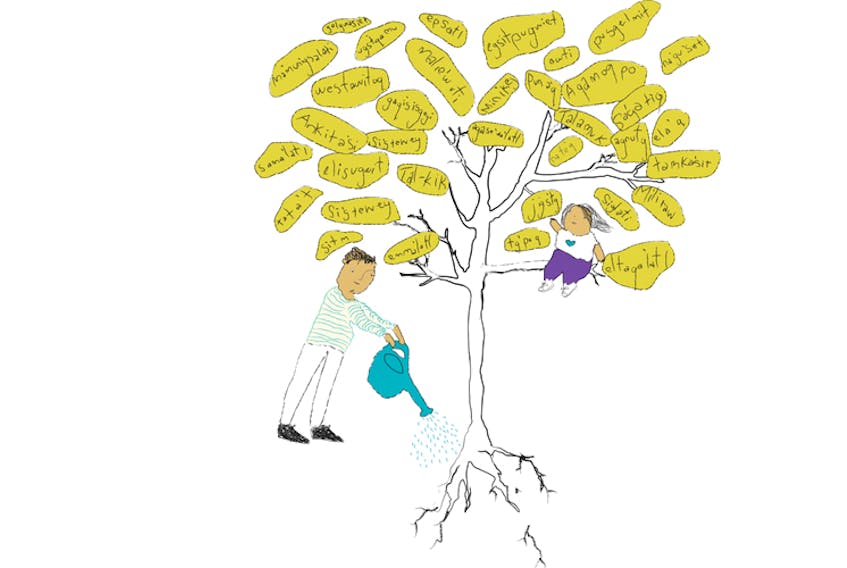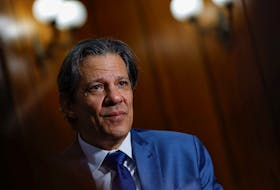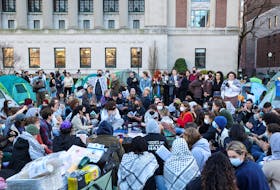Growing up on the Sipekne'katik First Nation in Nova Scotia, (formerly known as Shubenacadie), Bryson Syliboy was discouraged from learning Mi’kmaw, Mi’kmaq, his people's traditional language.
He wasn’t alone.
Syliboy, who now lives in Port Hawkesbury and works as a lifeguard at the local pool, makes the connection between the rejection of his native tongue and the trauma endured by his parents (and his people) in the residential school system.
“I'm a descendant of residential school survivors. So in my family, we weren't really allowed to speak it [Mi’kmaw] when we were little,” he says. “Our parents wanted to give us the opportunity to be more than what they were; you know what I mean? So they wanted us to pretty much assimilate.”
Syliboy estimates that of his Mi’kmaw peers, close to 90 per cent likely have a similar story. But due to a resurgence of interest in reclaiming Indigenous language and culture, that story is beginning to change.
Following in the footsteps of others, like Savvy Simon — an entrepreneur and educator from Elsipogtog First Nation in New Brunswick who created the #SpeakMikmaq hashtag — Syliboy is reclaiming the lost words. For the last two years, he's been sharing a Mi’kmaw ‘word of the day’ on Twitter. Initially using only phonetics, this past March he started posting short videos at the urging of his followers.
Mi’kmaw word of the day:
— Bryson The Gaytive (@BSilipay) August 17, 2019
Kekna’sit (ge gê nah sidt) (he / she dresses up)
How do you say it in your language or a language you know?#mikmawwords pic.twitter.com/aWGpqtymvJ
“I started to learn, to try to learn, Mi’kmaw about nine years ago. I'm not fluent, but I'm trying to reconnect with my language,” Syliboy says. “it gives you a sense of who you are, your heritage, your culture. It ties you to the land, it ties you to your people. And it's a great way to communicate with your elders.”
Ultimately, his goal is to speak fluently to his father.
“Every little bit helps,” says Bernie Francis, of the renewed interest (of Indigenous people and settlers alike) in revitalizing Mi’kmaw language and culture.
Francis, a linguist from Maupeltu (Membertou) First Nation in Cape Breton, N.S., developed — with his mentor and partner Doug Smith between 1974 and 1980 — a new orthography (conventional spelling system) of the Mi’kmaw language. Today the Smith/Francis orthography is officially recognized by Nova Scotia's Mi’kmaw chiefs and the Canada-Nova Scotia-Mi’kmaq Tripartite Forum.
“If people are interested in maintaining the culture, then you have to maintain the language, it's that simple,” says Francis. “If you speak English only, you see the world through that particular filter. If you speak Mi'kmaw, you can see the world as a Mi'kmaw person. If we're serious about the culture and understanding it, then we should pay attention to learning.”
If you can't learn to speak it, says Francis, then learning about the language is the next best thing.
“That will help tremendously,” says Francis. “That way, you begin to understand the culture and why Mi'kmaw people think the way they do.”
For both Francis and Syliboy, government (provincial and federal alike) has a role to play in the revitalization of Indigenous language.
“It should be their duty to reestablish our languages,” says Syliboy. “ To have the resources out there to help people reconnect [with their language].”
“There are only 8,000 or 9,000 [Mi’kmaw] speakers left, which means the language is dying,” says Francis, of why he feels the government should provide materials, infrastructure, and funding to the Mi’kmaw people (and other tribal nations) to help strengthen Indigenous cultures. “With truth and reconciliation, people across the country realized their languages are very important — the heart of the culture. So, if they want to practice their culture, they should know the language.”
“I would love to see a revitalization,” says Syliboy. “I would love to see the younger generations be fluent. My generation, we're kind of like the lost generation. We never really had that connection to our people, to our language, to our culture. So, I'm hoping our language will be preserved for generations to come.”
Mi’kmaw language resources
Books
- The Mi’kmaw Grammar of Father Pacifique, New Edition By Bernie Francis and John Hewson
- The Language of This Land, Mi’kma’ki By Trudy Sable and Bernie Francis
Social Media
Word of the Day
- Twitter: Bryson Syliboy @BSilipay
- Instagram: @brysonsyliboy
- Language Keeper (Talon & Heidi Simon)
Robyn McNeil is all about her kid, her cat, her people, good stories, strong tea, yoga, hammocks, and hoppy beer.
More Alternative Lifestyles:
- Brian Braganza came to rural Nova Scotia and helps people find the courage to make a better world
- Cape Breton's Amber Tapley reshaped her life and launched a healing business
- Last Stop Alaska: Couple moves into school bus and sets out on journey of a lifetime
- Get in touch with nature with open air learning
- Off grid living in Cape Breton
- Speak the language, save the culture: Working to preserve Mi’kmaw in Nova Scotia
- Baking and being non-binary in Atlantic Canada









